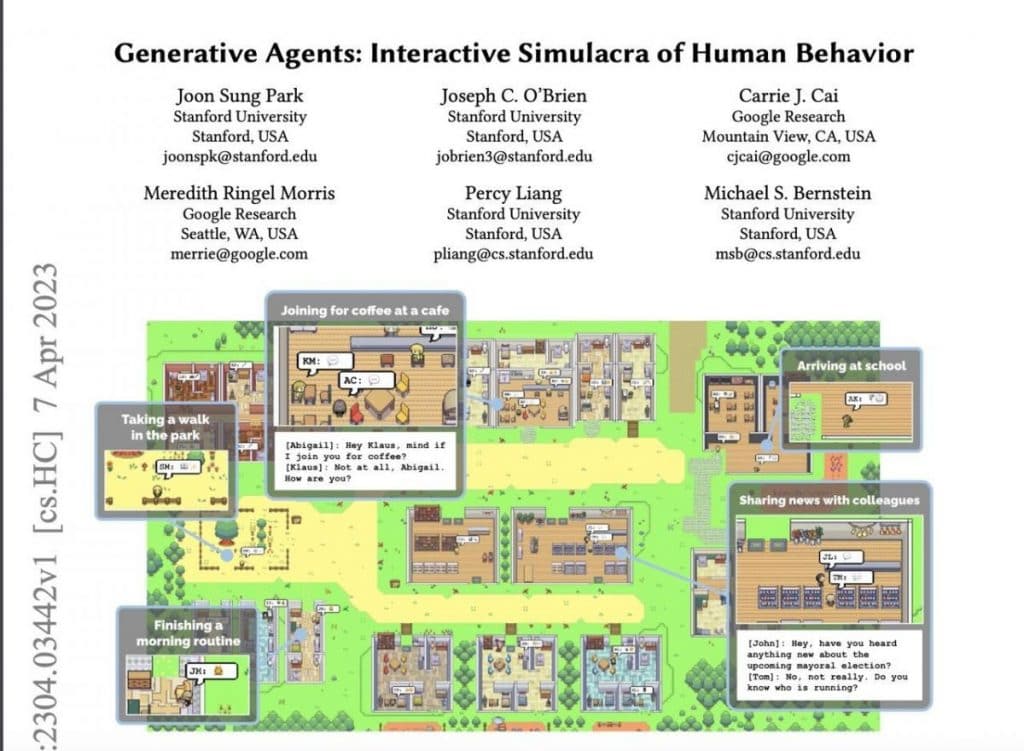Researchers Model GPT-4 After The Sims; NPCs Play Together

In Brief
Researchers of Standford University modeled their AI engine after The Sims to create a virtual world home to 25 characters, each with their own character, memories and personalities.
The goal of the experiment was to observe how AI can imitate human behavior.
Recently, researchers of the Standford University modeled their very own Artificial Intelligence (AI) engine that utilizes GPT-4 Natural Language Model after the popular life-simulation video game, The Sims. By doing so, the researchers aim to create a virtual world home to 25 characters, each with their own character, memories and personalities, in which AI can play various roles, from attending a Valentine’s Day party to even striking up dates with one another.

The goal of the experiment is to observe how AI can effectively imitate human behavior, and it’s been reported by the researchers that the AI is doing so better than even the people who were originally charged with playing these characters. Researchers launched the gaming bot of virtual characters to test the effectiveness of the AI in playing games, converse with each other, and realistically exhibit human-like behaviour.

The team developed 25 identical personalities, each agent receiving an individual character who had been given its set of memories, goals, and motivations from the researchers. To simulate the behaving, the researchers measured and collected metrics such as how often the agents, for example, took part in conversations, whether those conversations were one- or two-way, whether the conversation was initiated by the agent or someone else, or how much the conversations were about something specific versus general musings. These results were used to train the AI and teach it how to act like a human, improving its conversational competence daily.
The authors also claim that the way in which the AI behavior is far more human-like than that of the people asked to play these characters. They have even produced a demo video showing off their virtual men’s movements. Through their research, they’ve come to the conclusion that the AI agents not just observed, planned, and reflected on their observations and planned better but became more efficient than those controlling them, as each of the agents was exploring the same environment independently.
Check out the demo here.
Read more about AI:
Disclaimer
In line with the Trust Project guidelines, please note that the information provided on this page is not intended to be and should not be interpreted as legal, tax, investment, financial, or any other form of advice. It is important to only invest what you can afford to lose and to seek independent financial advice if you have any doubts. For further information, we suggest referring to the terms and conditions as well as the help and support pages provided by the issuer or advertiser. MetaversePost is committed to accurate, unbiased reporting, but market conditions are subject to change without notice.
About The Author
Damir is the team leader, product manager, and editor at Metaverse Post, covering topics such as AI/ML, AGI, LLMs, Metaverse, and Web3-related fields. His articles attract a massive audience of over a million users every month. He appears to be an expert with 10 years of experience in SEO and digital marketing. Damir has been mentioned in Mashable, Wired, Cointelegraph, The New Yorker, Inside.com, Entrepreneur, BeInCrypto, and other publications. He travels between the UAE, Turkey, Russia, and the CIS as a digital nomad. Damir earned a bachelor's degree in physics, which he believes has given him the critical thinking skills needed to be successful in the ever-changing landscape of the internet.
More articles

Damir is the team leader, product manager, and editor at Metaverse Post, covering topics such as AI/ML, AGI, LLMs, Metaverse, and Web3-related fields. His articles attract a massive audience of over a million users every month. He appears to be an expert with 10 years of experience in SEO and digital marketing. Damir has been mentioned in Mashable, Wired, Cointelegraph, The New Yorker, Inside.com, Entrepreneur, BeInCrypto, and other publications. He travels between the UAE, Turkey, Russia, and the CIS as a digital nomad. Damir earned a bachelor's degree in physics, which he believes has given him the critical thinking skills needed to be successful in the ever-changing landscape of the internet.



















































